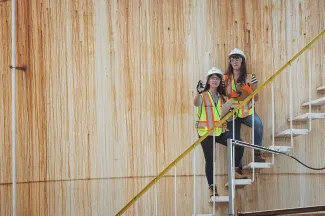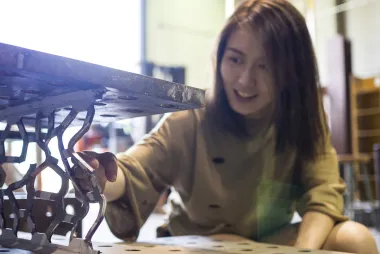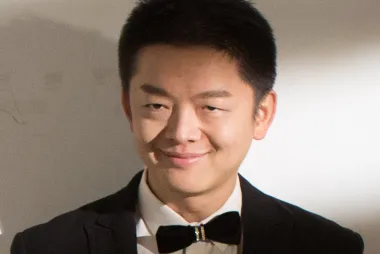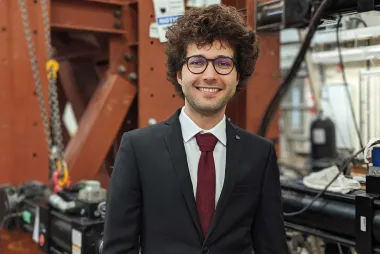"Being an engineer, you have an opportunity to create things and to bring your dreams into reality."
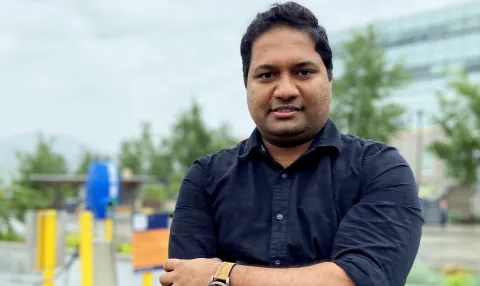
Piyaruwan Perera
- Degree: Doctor of Philosophy
- Grad year: 2020
- Program:
- Campus: Okanagan
Piyaruwan completed his bachelor’s degree in Civil Engineering at the University of Moratuwa in Sri Lanka. He then successfully completed a MSc in Civil Engineering at the same university. Later, he earned a MBA from the Post Graduate Institute of Management (PIM) at the University of Sri Jayewardenepura in Sri Lanka. In addition to his academic experiences, Piyaruwan has five years of industrial experience in both engineering and management capacities. In Sri Lanka, he worked for the Road Development Authority as a planning engineer and for Laugfs Gas PLC as a logistics manager.
At UBC, Piyaruwan's research focus is the development of green transportation in Canada by scientifically deploying and managing essential green upgrades for household and transportation sectors. The findings of his research are a remarkable help to Canadian municipalities in their promoting the use of low-emission electric vehicles to achieve national Greenhouse Gas (GHG) reduction targets.
Currently, he has authored/co-authored six journal articles, two articles currently under review and three peer-reviewed conference articles. He has presented his work in national and international conferences such as the Canadian Society of Civil Engineers (CSCE) Annual General Conference in Vancouver, BC, and the International Conference on New Horizons in Green Civil Engineering (NHICE) in Victoria, BC.
Piyaruwan believes that "continuous learning is like planting a tree and watering it to grow; it is an investment for the future; it shapes your life and enhances your values, both professionally and academically. Being an engineer, you have an opportunity to create things and to bring your dreams into reality."
Why did you choose to go into your field of study at UBC?
Engineering makes humanity. An engineer has the ability and craftsmanship to visualize, design and create things that make humans unique in the world. Since my childhood, I enjoyed disassembling household items, learning their structure, understanding the internal mechanics and definitely put them back together. By doing that, it always made me think a step further, trying out innovative ways to make things a lot easier than the conventional approach. With that ability, I chose engineering as my ultimate career in order to develop concepts and ideas to apply into our day-to-day life.
What has made your time at UBC memorable?
Generally, for a person who was born and brought up in a country from the other corner of the world, coming to a new country as an international postgraduate student, settling in a novel community, could open up a whole new set of challenges. Even for me, after graduating as a civil engineer and working in the energy sector for a while in Sri Lanka, coming to Canada alone and getting into the student mode again brought mental and emotional struggles. During that transition period, the support from the LCM Group (Life Cycle Management) at UBCO and my supervisors and my colleagues was extraordinary. All the hardships and obstacles were quite easily managed with the support received during the first six months. This led to memorable moments to cherish and life-long friendships. In addition to that, the exposure I had to diversified cultures, friends and research interests was really remarkable.
What has been your most valuable non-academic experience studying at UBC?
UBC is a home to a diversity of students coming from different cultures, disciplines, ethnicities, talents, etc. The value and colour these differences add into the university atmosphere is incredible. I personally have befriended many of these amazing individuals and there is a lot to learn from each of these individuals.
Tell us about your experience in your program. What have you learned that is most valuable?
Engineering is all about making things easy for the society. I’ve been studying Engineering for years, from my bachelor’s degree to my PhD. The knowledge I gathered from my studies supports me to understand problems from multiple lenses and in multiple dimensions so as to derive the maximum benefits out of it.
Being a Civil Engineering graduate, I specifically focused on Construction and Project Management in my graduate studies at UBC. I was able to integrate the managerial experiences I obtained while working in the industry with the engineering concepts I developed during my research activities to create industry-ready solutions that can be applied to increase the efficiency and sustainability of the built environment.
How are you applying the skills you learned through your studies at UBC?
The world is moving towards low-emission or zero-emission alternatives to reduce Greenhouse Gas (GHG) emissions. In this paradigm, my contributions will focus on developing sustainable interventions for the built environment by planning, deploying and managing essential green upgrades for household and transportation sectors. The multidimensional problem-solving skills that we practice in the engineering discipline can be directly applied to building and transportation sectors for their infrastructural decision-making process. The life cycle thinking approach is a novel contribution to the developing world that will generate great value in strategic decision-making towards a sustainable future.
What advice would you give a student entering your degree program?
Graduate studies can be categorized into two groups: taught studies and research-based studies. Research-based studies are highly focused on the research problems, in which you are responsible for the overall process from start to finish. Always try to collect necessary information from literature, experts and your colleagues. Then carefully develop your research question, work methodology, milestones and specific deliverables. Focus on more publications, which enhance the value of your findings and provide you access to the research community. Simultaneously, try to balance your work with day-to-day life. Keep sufficient time to travel, do fun things, network and explore your surroundings. Keep your supervisors in the loop regarding all your activities during your time at UBC. Graduate studies are memorable, fun and stress-free if you plan everything precisely and make decisions wisely.
How do you feel your degree has benefitted you compared to a different field of study?
In my view, engineering is the backbone of all other fields. Except for engineering, most other fields are working towards solving existing problems and developing methods to minimize negative results without failing the overall system. Engineers are working towards inventing creative solutions to maximize the positive results of an activity and developing a process to make something more efficient, sustainable and resilient. In addition to that, engineering makes me an open-minded, hard-working person who can challenge traditional workflows and processes. Being a successful engineer, you are capable of transforming your ideas or dreams into reality.
Where do you find your inspiration?
I was inspired by my parents and my teachers, who made me the person I am today. My mother and father both started their life from scratch, and they showed me the importance of education and a constructive path towards the success. My teachers, particularly my PhD and MSc supervisors, discovered my unique skills and guided me to achieve the maximum results from my capabilities. Their mentorship as teachers and as friends was really helpful in developing my skills both professionally and academically, and also helped me to maintain a work-life balance.
What are your immediate and/or long-term plans for the future?
The plan is to complete my doctoral viva within the next few weeks (by the time you are reading this, I might already be done) and pursue a post-doctoral position for several months. Then I am open to an industrial position or an academic position in Civil Engineering, specifically in the field of Construction and Project Management. In the long run, I would like to become an entrepreneur who can provide the leadership to build an empire and leave a legacy.
What are your future plans to make a difference in our world?
I would like to utilize my knowledge and expertise to encourage sustainable practices and achieve sustainable goals to heal the world. I believe in a zero or at least a minimal carbon footprint. Hence my future research focus will be reducing high carbon-intense fuel use and creating energy-efficient construction practices. Developing clean transport initiatives, clean building options and green communities will enhance the life of the citizens while maintaining a healthier and more resilient world.
